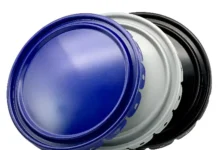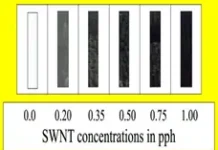By Liz Stevens, writer, UV+EB Technology
“You make a better door than a window.” This phrase, commonly heard in households where one family member blocks another’s view of the TV, hinges on the fact that a door blocks while a window reveals.
But what if a window could also be a door?
What if a window could become fully opaque on demand, offering complete privacy?
What if a window could be crystal clear to reveal the view outside and let in the light but also could offer variable translucence depending upon the outside level of illumination and the wishes of the inhabitants?
What if a window could be aware of geographic and meteorologic data, and adjust its properties depending on its location, the season and the changing weather conditions?
What if a window could be whip smart with built-in electronics yet require only minimal energy to operate?
What if a window could pay for itself by insulating against excessive heat and cold, and maybe do even more?
What if a window could do all of this while harmonizing with the interior environment’s color scheme?
And what if a window like this could be manufactured affordably at scale via green manufacturing?
Hari Atkuri, PhD, MBA, co-founder and CEO, Mohan Atkuri and Vassili Sergan, PhD, and CTO of Smart Glass Labs, Minnetonka, Minnesota, have been asking themselves questions like these. As a result, after much time spent in research and analysis, they have pioneered a new way to imagine, build and position the smart window. Upon developing this technology, the team expanded to include Ben Jayson, business development officer, to develop the business’s growth strategy and support product development.

Currently, the existing smart window product line comprises electrochromic or liquid crystal technologies that are limited to offering privacy via a frosted glass effect or offering light blocking in a narrow range of translucence, but there is no option for combining both of these functions in one product. Electrochromic or liquid crystal technology also has drawbacks that affect production, environmental issues, product options, true effectiveness and aesthetics.
Understanding the Limitations of Traditional Smart Windows
The manufacturing of traditional electrochromic or liquid crystal products revolves around producing electro-chemical materials that require metal oxides and production techniques that require vacuum deposition equipment, cleanrooms and a time-consuming coating/curing process.
The size of traditional smart windows is limited by the maximum size of the vacuum deposition equipment available to coat the glazing substrates. These windows have a high in-factory failure rate and windows that contain even a small defect can lead to failure while in use – leaving windows stuck in a transparent, opaque or intermediate optical state. Liquid crystal products tend to short circuit near their end-of-life, flickering between states until replaced. Environmental factors, such as humidity and temperature fluctuations, adversely can affect the technology. Traditional smart window products require full-area electrification and have an appreciable operating energy cost. If a window cracks or breaks, liquid crystal material can escape, causing environmental harm.
Customers of traditional smart windows have expressed dissatisfaction in areas ranging from the aesthetic to the functional. There are limited color options available for the products. There can be inconsistency in the appearance of the windows as they transition from state to state, and difficulty in matching precise colors when replacing a window. Windows that feature automatic darkening never are completely transparent and cannot be completely darkened. Installation can be a complex project, and operation of installed windows can have a real learning curve. Current smart windows can be expensive, and some customers are unhappy at having to choose between a product that delivers privacy and one that offers variable darkening.
Solving Traditional Smart Window Limitations
Smart Glass’s Kinetic Glass is a new entry into the electrochromic glass arena; a product in which design has been revolutionized and in which every component has been finetuned and optimized. The company has extensive experience with traditional smart glass products and their functionality, having acquired Gamai Tech International, a company that pioneered smart glass technologies. Vassili Sergan, the founder of Gamai, has 30+ years’ experience in developing testing tools for smart glass technology and has expertise in developing polymer-dispersed liquid crystal products. Smart Glass Labs also relied on strategic advisors Rick Locke and Mike Idacavage for their support during the development process.
Ben Jayson described the aha moment that sparked Smart Glass’s pivot from liquid crystal smart window technology to something entirely different. “The initial concept for a new product was to create something to replace blinds and curtains,” Jayson said, “That was our intent. But we realized that if we were to change the material to compete directly with the electrochromic industry by blocking light and providing privacy in one product, this could be very exciting and could offer great market potential. Additionally, we found that we could overcome a lot of the drawbacks of traditional smart windows. That was a big moment.” Hari Atkuri added his own epiphany. “Once we realized the options we had for the selection of materials, we saw that it also was possible to select any color for the window’s pane,” said Atkuri. “The color could be semi-translucent, completely translucent or could offer privacy with a frosted glass appearance. It even could have a mirror-like appearance.”
Another revelatory moment for the team was their realization about adding the “smarts” to their incarnation of a smart window. “One thing that really came easy to us was the ability to add electronics that can be integrated with AI,” said Atkuri. “By integrating AI and tapping into information such as weather data, the building’s geographic location, the time of year and a window’s orientation to the sun, a Kinetic Glass window can allow customers to enjoy the comfort of smart windows without having to be in charge of managing the windows’ operation.” The design for Kinetic Glass also potentially could allow its smarts to adjust the IR transmission/reflectivity of the windowpane – an advantage for mitigating solar heat gain.
Kinetic Glass is a multi-purpose product based on a relatively simple set of materials, with no metal oxides needed and no chemical reactions involved. Its manufacture is cheaper, faster and cleaner than traditional electrochromic windows, with no cleanroom required. The product has a minimal energy requirement and poses no health risks or environmental danger if a window is broken. The design can be produced in a wide range of colors and could be engineered to offer custom colors or dynamic color variability.
For a complete seal and precision fit of components as well as high quality and superior durability, Smart Glass Labs chose to encase its Kinetic Glass product in UV-cured material. The speed at which the material can be cured during manufacture was another selling point for the UV-cured choice.
At its core, Kinetic Glass works by controlling organic materials to create optical variability via mechanical means, rather than by the traditional smart window method of manipulating liquid crystals by electro-chemical means. Recognized as a member of the RadLaunch Class of 2023 by RadTech International North America, the association explained, “UV photopolymerization is one of the core technologies of Kinetic Glass. The UV process is a key and necessary step to ensure durability and, by testing and adapting the use of various UV materials and UV processes, Smart Glass Labs can ensure superior aesthetics, seal protection and structural stability.”
Smart Glass Labs aims to live up to its tag line – Revolutionizing Spaces: Award-Winning Kinetic Glass – Unleash Brilliance for a Secure, Sustainable, and Next-Gen World – by building awareness about this new approach to electrochromic windows. Smart Glass Labs also is a resource for companies searching for innovative solutions and for companies seeking avenues to bring their own innovative technologies to market. For more information, visit www.smartglasslabs.com.






